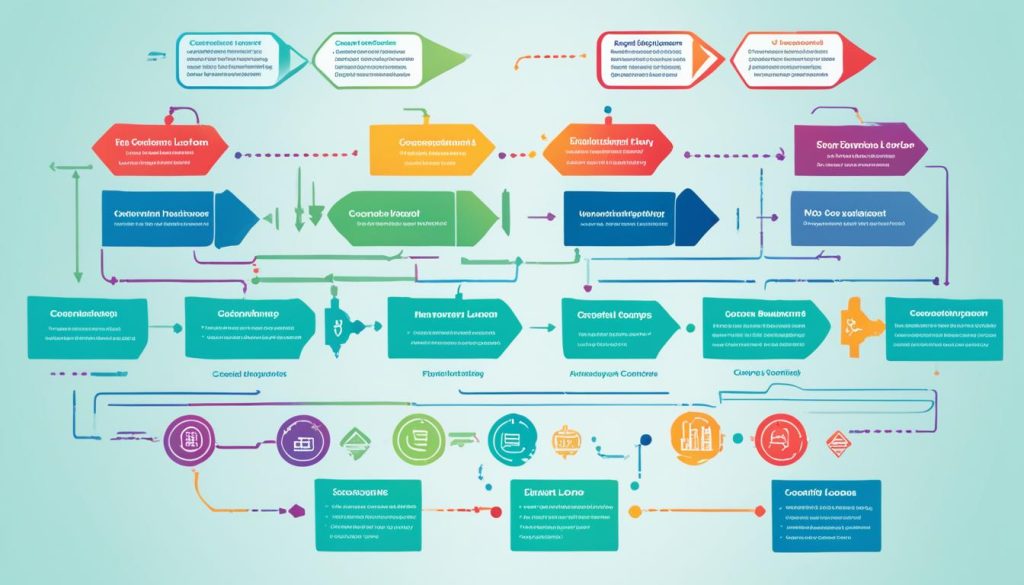When it comes to financing solutions for your business’s growth and expansion, unsecured business term loans can provide the stability and flexibility you need. Unlike secured loans that require collateral, unsecured business loans assess the creditworthiness and financial stability of your business, offering a viable option for businesses that may not have valuable assets to pledge.
Unsecured business loans can be used for a variety of purposes, including working capital, purchasing inventory or equipment, expanding operations, or funding marketing campaigns. These loans offer quick access to funds without putting your assets at risk. While they may have higher interest rates compared to secured loans, they provide the flexibility you need to propel your business forward.
Key Takeaways:
- Unsecured business term loans do not require collateral and assess the creditworthiness and financial stability of your business.
- These loans offer flexibility in accessing funds for various business purposes.
- Interest rates on unsecured business loans may be higher compared to secured loans.
- It is important to carefully evaluate your business’s eligibility and consider the advantages and costs of unsecured loans.
- Unsecured business term loans can support your future growth and financial stability.
Understanding Unsecured Business Loans
Unsecured business loans provide an alternative financing solution for businesses without requiring collateral. These loans rely on the creditworthiness and financial stability of the business, allowing them to access funds without pledging assets. Lenders assess various factors, including the business’s credit score, revenue, time in operation, and industry performance, to evaluate the risk involved.
By not requiring collateral and focusing on creditworthiness and financial stability, unsecured business loans offer businesses greater flexibility when it comes to accessing funds. This can be particularly advantageous for businesses that may not have substantial assets to use as collateral. However, it’s important to note that unsecured loans typically come with higher interest rates compared to secured loans due to the increased risk for lenders.
When applying for an unsecured business loan, it’s essential for businesses to demonstrate their creditworthiness, financial stability, and ability to repay the loan. This can be done by maintaining a good credit score, showcasing consistent revenue streams, and providing relevant financial documentation. Lenders will carefully assess the risk associated with approving the loan and determine the loan amount and interest rate based on their risk assessment.
“Unsecured business loans provide businesses with the flexibility to access funds without pledging assets as collateral.”
While unsecured business loans offer quick access to funds, it’s important for businesses to carefully consider their ability to repay the loan. The higher interest rates associated with unsecured loans can result in higher overall costs. However, for businesses looking to fund growth initiatives or take advantage of new opportunities, unsecured loans can provide the necessary financial support.
Benefits of Unsecured Business Loans:
- Flexibility: Unsecured loans offer businesses flexibility in using the funds for various purposes, from covering operational expenses to investing in growth initiatives.
- No Collateral Required: Businesses can obtain funds without risking valuable assets as collateral.
- Quick Access: Unsecured business loans typically have a faster approval and funding process compared to secured loans.
- Opportunity to Build Credit Score: Responsible repayment of an unsecured loan can help businesses build and improve their credit score for future financing needs.
Overall, understanding unsecured business loans is crucial for businesses seeking flexible financing options. While they don’t require collateral, lenders assess creditworthiness and financial stability to evaluate risk. With the potential benefits they offer, unsecured business loans can be a valuable tool for businesses looking to access funds and fuel their growth.
Key Features of Unsecured Business Loans
Unsecured business loans offer businesses a range of key features that set them apart from other financing options. Understanding these features can help businesses make informed decisions and choose the most suitable funding solution. Let’s explore the key aspects of unsecured business loans:
- Loan Amount: Unsecured business loans typically offer smaller loan amounts compared to secured loans. The specific loan amount will vary depending on the lender and the borrower’s financial situation. It’s important for businesses to assess their funding needs and determine if the loan amount offered aligns with their requirements.
- Interest Rates: Unsecured business loans often come with higher interest rates compared to secured loans. This is because lenders bear more risk, as there is no collateral to secure the loan. Businesses should consider the interest rates offered and evaluate the overall cost of borrowing before committing to a loan.
- Repayment Terms: Repayment terms for unsecured business loans are typically shorter compared to secured loans. The repayment period can range from a few months to several years, depending on the lender and the loan amount. It’s essential for businesses to carefully assess their cash flow and determine if they can meet the repayment obligations within the specified timeframe.
- Eligibility Criteria: Eligibility criteria for unsecured business loans vary among lenders. Common factors considered include the business’s creditworthiness, financial stability, and revenue. Lenders may also take into account the purpose of the loan and the borrower’s industry performance. Businesses should carefully review the eligibility criteria and ensure they meet the requirements before applying for a loan.
- Use of Funds: The loan amount obtained through an unsecured business loan can be used for various business purposes. This can include working capital, inventory purchases, equipment investments, marketing campaigns, or expansion plans. Businesses should clarify the permitted use of funds with the lender and ensure they align with their specific needs.
It’s important for businesses to consider these key features before opting for an unsecured business loan. Assessing loan amounts, interest rates, repayment terms, eligibility criteria, and use of funds allows businesses to determine if unsecured business loans are the right choice for their financing needs. By thoroughly evaluating these factors, businesses can make informed decisions and secure the funding required for their growth and success.

How Unsecured Business Loans Work
To obtain an unsecured business loan, businesses need to meet the eligibility criteria set by lenders. The eligibility criteria include factors such as creditworthiness, business age, financial stability, revenue, and the purpose of the loan. Lenders evaluate these criteria to assess the risk associated with lending to a particular business.
Once a business determines its eligibility, it can begin the application process. This process involves researching and comparing lenders to find the best fit for its needs. Businesses are required to submit an application along with the necessary supporting documents.
Tip: It’s essential to have all the required documents organized and readily available to save time during the application process.
After submitting the application, the lender proceeds with assessment and underwriting. This step involves closely examining the business’s financials, credit history, and other relevant factors to determine the loan’s feasibility and terms.
Quote: “Unsecured business loans provide a valuable financing option for businesses that require flexibility and quick access to funds without pledging collateral.” – Financial Expert
Once the lender approves the loan, the business receives details regarding the loan amount, interest rate, and repayment terms. It is crucial for businesses to review these details carefully before accepting the loan offer.
Repayment of an unsecured business loan requires adhering to the agreed-upon repayment schedule. Businesses should consider factors such as loan tenure, interest rate, and prepayment options when planning their repayment strategy.
Repayment Terms
Unsecured business loans typically come with specific repayment terms that borrowers must fulfill. Here are some common repayment terms:
| Repayment Term | Description |
|---|---|
| Monthly Installments | Borrowers make fixed monthly payments, including principal and interest, until the loan is fully repaid. |
| Interest-Only Repayment | Borrowers pay only the interest portion of the loan each month, with the principal amount remaining unchanged. At the end of the loan term, they must repay the remaining principal. |
| Deferred Repayment | Borrowers have a grace period during which they do not have to make any loan payments. Repayment begins after the grace period ends. |
Understanding the repayment terms is essential to ensure that businesses can meet their financial obligations and successfully repay the loan within the agreed timeframe.

Advantages of Unsecured Business Loans
When it comes to financing options, unsecured business loans offer numerous advantages for businesses. These loans provide the financial flexibility needed to support growth and expansion without requiring collateral.
One of the key advantages of unsecured business loans is that they do not require any collateral. This means that businesses can access the funds they need without putting their valuable assets at risk. Unlike secured loans that require tangible assets like property or equipment to secure the loan, unsecured business loans solely rely on the creditworthiness and financial stability of the business.
Another advantage of unsecured business loans is the lower costs compared to alternatives like credit cards or short-term loans. While unsecured loans may have slightly higher interest rates than secured loans due to the increased risk for lenders, they are often a more cost-effective borrowing option. Businesses can avoid high interest rates and fees associated with credit cards, which can save them significant amounts of money in the long run.
Furthermore, responsibly repaying an unsecured loan can help build or improve a business’s credit score. Timely payments and managing the loan effectively demonstrate the business’s financial responsibility and can have a positive impact on its creditworthiness. This improved credit score can open doors to better financing options and terms in the future.
Overall, unsecured business loans provide businesses with the financial freedom and flexibility they need to pursue their goals and objectives. With no collateral required, lower costs compared to alternatives, and the opportunity to build credit, these loans are a valuable tool for businesses looking to grow and thrive.

| Advantages of Unsecured Business Loans |
|---|
| No Collateral Required |
| Financial Flexibility |
| Lower Costs |
| Building Credit Score |
Conclusion
Unsecured Business Term Loans provide the stability and flexibility that businesses need to support their growth and future planning. These financing solutions offer quick access to funds without requiring collateral, allowing businesses to focus on expanding their operations and meeting their financial goals.
By carefully evaluating their eligibility and considering the advantages and costs, businesses can make informed decisions about utilizing Unsecured Business Term Loans. While these loans may have higher interest rates compared to secured loans, they provide valuable financing options for businesses that may not have significant assets to offer as collateral.
With the flexibility to use the funds for various purposes, ranging from working capital to purchasing inventory or equipment, Unsecured Business Term Loans empower business owners to make strategic investments that contribute to their long-term growth and stability. By leveraging these financing solutions, businesses can align their financial resources with their future growth planning and capitalize on opportunities for success.
In the dynamic business landscape, having access to flexible financing options is crucial for sustainable growth. Unsecured Business Term Loans offer businesses the stability and support they need, allowing them to navigate challenges, seize opportunities, and achieve their business objectives. With a wide range of Business Loan Options available, business owners can find the right financing solution that propels their growth and secures their future.




No comments! Be the first commenter?